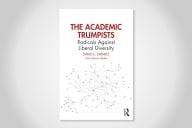You have /5 articles left.
Sign up for a free account or log in.
Law schools are distributing financial aid in a manner than helps the schools more than students. Legal education requirements limit innovation in the curriculum -- and close off models that may be more affordable. The faculty role in legal education needs rethinking at many institutions -- and tenure systems shouldn't be required for accreditation.
These are among the conclusions of a special panel of the American Bar Association that has completed a lengthy review of legal education, and that issued its report -- for consideration by law schools, the legal world and the public -- early this morning. Many of the recommendations would represent significant change either for law schools or their accreditor. The report arrives at a time of widespread criticism of law schools, a call by President Obama to shave a year off of law school, and falling enrollments. And many of its ideas are controversial.
While some legal educators have questioned just how much of a crisis law schools face, the ABA report opens by making clear that it views the system as in need of a substantial overhaul.
"At present, the system faces considerable pressure because of the price many students pay, the large amounts of student debt, consecutive years of sharply falling applications, and
dramatic changes, possibly structural, in the jobs available to law graduates," the report says. "These have resulted in real economic stresses on law schools, damage to career and
economic prospects of many recent graduates, and diminished public confidence in the system of legal education. The predicament of so many students and recent graduates who may never procure the sort of employment they anticipated when they enrolled in their law schools has been particularly compelling."
The report says that law schools are using financial aid policies in ways that are designed to improve the institutions' reputations, but that leave many students facing large debt burdens.
"A currently widespread practice is for a school to announce nominal tuition rates, and then chase certain high LSAT/GPA students by offering substantial discounts (styled as scholarships) without regard to financial need. Other students, by contrast, receive little if any benefit from discounting and must rely extensively on borrowing to finance their education and various federal programs make such loans virtually open-ended," the report says. "One result is that students whose credentials are the weakest incur large debt in order to sustain the school budget and enable higher-credentialed students to attend at little cost. Many of these less credentialed students also have lower potential return on their investment in a legal education. These practices are in need of serious re-engineering."
The issue of tenure has been debated intensely by the panel. Those who have pushed for removing tenure systems as an accreditation requirement have said that they are not necessarily opposed to tenure, but do not see the decision to have a tenure system as one that accreditors should make. Some have argued that law schools would benefit from more part-time professors who are also working lawyers. Many law school professors, however, have said that tenure is crucial to academic freedom.
The tenure issue specifically doesn't get a lot of play in the report. But the existing requirement that law schools have tenure systems is listed among a series of policies that should be "eliminated or substantially liberalized," the report says.
It goes into more detail on the faculty role, pushing a system that places more emphasis on training for legal careers, as opposed to academic scholarship.
"Law schools have a societal role: to prepare individuals to provide law-related services," the report says. "Much of what the task force heard from recent graduates reflects a conviction that they received insufficient development of core competencies, particularly those relating to representation and service to clients, that make one an effective lawyer."
The report suggests that "faculty culture" at many law schools places an emphasis in contrast on the academic study of law, and the panel found this to be problematic at many institutions.
It is time for "a constructive change in faculty culture and faculty work," the report says.
"Prevailing law faculty culture, and the prevailing faculty structure in a law school, reflect the model of a law school as primarily an academic enterprise, delivering a public good. This entrenched culture and structure has promoted declining classroom teaching loads and a high level of focus on traditional legal scholarship," the report says.
"Some, perhaps many, law schools will continue to operate under the current model," the report adds. "But for law schools that choose to pursue other models, faculty culture and faculty role may have to change to support them. These changes may relate to: accountability for outcomes; scope of decision-making authority; responsibilities for teaching, internal service, external service, and scholarly work; career expectations; modes of compensation; interdependence; scope of the category 'faculty' and internal classifications within that category; and a host of other factors."
While the report focuses primarily on training lawyers, it also suggests that state bar associations and judicial systems come up with ways to license non-lawyers to perform "limited legal services," and that bar admission be open to some who have not completed four years of undergraduate college and three years of law school. These changes are needed, the report says, because current delivery of legal services "may not be cost-effective for many who are in need of them, and some communities and constituencies lack accessible legal services."








